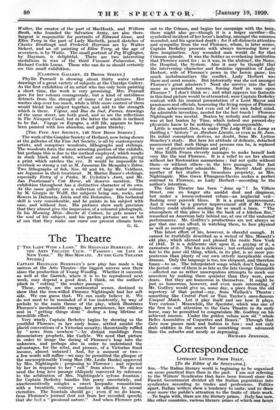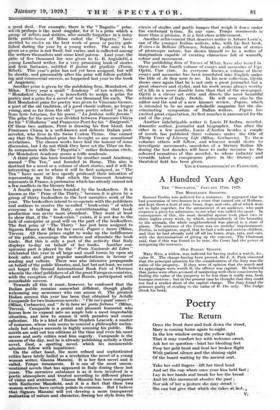Correspondence
LITERARY LETTER FROM ITALY. [To ..the Editor of the SPECTATOR.] • • —The Italian literary world is beginning to be organized on more practical lines than. in the past. I am not referring to the Writers' Syndicates that have been formed since the -Fascist -Government divided all the Italian population into syndicates according to trades and professions. Polities apart, Italian writers show a tendency to unite, and to draw ever more' the -public's attention to the fruits of their. work.
To begin with, there are the literary prizes. Italy has now, like other countries, various literary prizes of which one hears
a goOd deal. -For example, there is the " Bagutta " prize, wh:cli-perhaps is the most singular; for it is a prize which a group of artists and Writers, Wliti us-tinily-forgather in -ii noisy little public-house of Milan called the Bagutta," have decided to confer On the best work of prose or poetry pub- lished during. the year by a , young writer. The sum to be given as a prize is not fixed; but varies, and is collected among the writers themselves and some kind patron. Last year, the prize of five thousand lire was given to G. B. Angioletti, a young Lombard writer, for a very promising hook of stories and lyric fantasies, entitled Il giornct del giudizio (Turin, Ribet). This year's prize has not yet been assigned, but will be shortly, and presumably after the prize will follow publish- ing and commercial success, as happened last year to the book
of Angioletti. -
Another prize is given by the publishing firm, Mondadori, of Milan. Every year a small " Acadehiy " of ten writers, the " Mondadon Academy," is henceforth to assign a prize for poetry and a prize for a novel of ten thousand lire each. The first Mondadori prize for poetry was given to Vincenzo Gerace, a poet of the old tradition, of a good clasdic culture, no longer young, and as far from the old ", pure poetry school " as he is from lyric futurism, for his poem, " La fontana nella faresta." The prize for the novel was divided between Francesco Chiesa for his " Villadorna" and FranceseciPerri for his "Emigre/1th." Of these two authors, Perri is drawing his first blood, but Francesco Chiesa is a • well-known and delicate Italian poet- Mivelist, who lives in the Swiss Canton Ticino. One cannot say that the Mondadori prize has brought us any sensational revelations. The chosen works have had the honour of some discussion, but I do not think theyhaVe Set the Tiber on fire. In comparison With the "Ragutta's " rather Bohemian circle,
the MondadoriAcademy seems a trifle academic. ' A third prize has been founded by another small Academy, named " The Ten," and founded in ROme. This also is destined for a novel or a volrime of short stories, and it will be interesting to see to whoin it will be first assigned, as " The Ten " haire more or 'less openly professed their intention of representing in Italy that which the Goncourt Aeadethy represents in France, a pretension which has already caused not a few conflicts in the literary field.
'A fourth prize has been founded by the booksellers. It is known,as the " Prize of the Thirty," because, it is given by a group of thirty booksellers to the best narrative • work of the year. The booksellers intend to co-operate with the publishers and authors to resolve the so-called " book-crisis ' of which everyone is talking in Italy, notwithstanding that book production was never more abundant. They want at least to show that, if the " book-crisis " exists, it is not due to the hiek-of enterprise Or godd Will on the part of the booksellers. The first prize of " The Thirty " haS just, been assigned to Signora Bianea de Mai for her novel,. Pagare e Were (Milan, Treves). All these prizes ought to wake up the indifference of the public, encourage the writers and stimulate the book trade. But this is only a part of the activity that Italy displays to-day on behalf of her books. Another con- spicuous part is -played by the " Festa Nazionale del Libro " celebrated this year in all large and small towns by open air -Wok sales and great popular manifestations in favour of reading and culture. There was also intensive propaganda on behalf of the public libraries, and, last but not least, we must not forget the Second International Book Fair of Florence Wherein the chief publishers zif all the great-European countries, with the exception of England and- Russia, participated with remarkable success.
Towards all this it must, however, be confessed that the Italian public remains somewhat diffident, though gladly welcoming any newcomer who can amuse it. The greatest Italian success this year has been that obtained by Achille Campanile for two humorous novels : " Cheebs'e quest' amore ?" Milan; Corbaccio), and " Se la luna itti• porta fcrrturia " (Milan; Treves): Campanile is a genial and pleasant humorist who knOws how to expand into an ample tale a most improbable situation; and how to season it with paradox and comic aphorism. He is a kind of Italian. Stephen Leacock, a master of nonsense, whose vein seems to conceal a philodophie melan- choly but always succeeds in-highly amusing his public. -His novels are sold out ten editions at the time and even his most severe and surly critics read him eagerly. Campanile is the success of the day, and he is already publishing serially a third novel, Goal, a sporting novel, which his innumerable admirers follow with impatience. On the other hand, the more refined and sophisticated critics have lately hailed as a revelation the novel of a young woman writer, Gianna Manzini. It is her first novel and is called, Tempo innamorato. It is one of the most uncon- ventional novels that has appeared in Italy during these last years. The narrative substance is as it were involved in - a poetic atmosphere and treated according to different planes of vision and sentiment. Gianna Manzini has been compared with Katherine Mansfield-, and it is a fact that thede two women writers have certain points in common. But I believe -that Signora Manzini will yet develop a more transparent realization of nature and character, freeing her style from the excess of similes and poetic images that weigh it down under too eznibenuit lyrisin. Kn any case, Tempo innamoictio is more than a 'piomise; it is a first-class achievenient. Another achievement that deserves notice is Arturo Loria's, one of the younger Italian writers, who, with his first book, II clew e la Bellona (Florence, Solaria) a collection of stories of picaresque nature, has shown himself to be a writer of imagination capable of creating characters full of warmth, colour and movement.
• The publishing firm of Treves of Milan, have also issuel in these days the fourth volume of essays and memories of tTgo Ojetti, Cost Ws' te. As everyone knows, a volume of these essays and memories has been translated into English under the title of As they seem to me. In his new collection, Ojetti shows once again that he is not only a great journalist but a great observer and stylist, and his work seems always worthy of a life in a more durable form than that of the newspaper. Ojetti is a clever art critic and directs the most beautiful artistic review of Italy, Dedalo, He will soon also be the editor and-the soul of a new literary review, Pegaso, which is intended to be no mere scholastic magazine but the dis- criminating symposium of Italian writers. Pegaso has excited great expectation, its first number is announced for the end of the year. Another indefatigable writer is Lucio D'Ambra, novelist, dramatic author, journalist and biographer. One after the other in a few months, Lucio d'Ambm besides a couple of novels has published three volumes under the title of Thirty Years of Literary Life (Milan, Gorbaccio). To these volumes others will follow, and whoever would desire to investigate movements, anecdotes of a literary Italian life during the last decades, will have to make recourse to the coloured narratives of this novelist, to whose industry and versatile talent a conspicuous place in the literary and theatrical field has been given.
YOUR CORRESPONDENT IN FLORENCE.







































 Previous page
Previous page